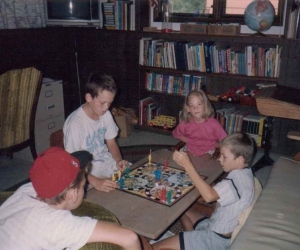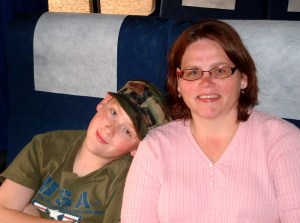Children need to be taught how to think critically and use discernment. Every day we are bombarded with images and information via computer and internet devices. The things we see and hear do impact and influence our thinking and behavior. When your children are young you decide which movies and other media they may view but as they age they can be involved in the choices and eventually discern and monitor themselves. Always keep in mind the goal of rearing independent adults. Practice assessing movies with your children. We may think entertainment is just entertaining, but it all promotes a message. Using discernment means to see beyond the obvious to what lies underneath; to look beyond the glitz and glamour to the substance. Teach them to evaluate and think about the stories, the plot and themes.
When viewing films at home it may be valuable to pause to discuss an issue or topic. Even children’s movies often have themes that need to be discussed. I often see films that have subtle anti-biblical themes or just political or social messages with which I do not agree. Teach your children to view media through a Christian lens. Teach them to think. Are we rooting for the primary character as he or she engages in illegal or immoral behavior? I am not suggesting we view questionable media just for the opportunity to discuss the negative themes. However when they arise, do not ignore them. Discuss them. God redeems the bad by bringing good from it. We can in minor ways follow his example. Positive themes also abound and we can watch for them as well. No entertainment is truly mindless. There is always a theme and a message being given or promoted. Explore it. Be critical and consider carefully the enterainment you watch and allow your children to digest.
When making a viewing decision about a movie, it is important to learn whose opinion and recommendation one can trust and whose cannot be trusted. This may be a painful or uncomfortable lesson. I have discovered that even friends from church may not judge movies in a similar manor as I do. Accepting a children’s movie recommendation from non-parents may not be as valuable as from other parents. Non-parent adults may not notice vocabulary or situations in a film that a parent may. There are a few websites that I believe give valuable and reliable reviews. Two of these are www.pluggedinonline.com and the subscription site www.screenit.com.
The world of media is rapidly changing and so we need to frequently reevaluate our family usage policies. Parental controls can and should be used on phones, computers, gaming devices and other sources. The more children are unsupervised the more controls need to be in place. I believe that computers accessible to children should be kept in public rooms such as a family room or dining room and never in bedrooms. Even phones should not be stored overnight in children’s rooms. This will avoid numerous problems.
Many parents provide their young children with cell phones. There are many circumstances in which cell phones provide convenience for parents to communicate with their children. That convenience also presents challenges and potential dangers and the decision to give a phone to a child should be carefully evaluated. Pay phones are nearly non-existent, yet almost every adult carries a cell phone. For example, if a child goes to a team practice, the coach will have a phone. Is your child truly mature enough to keep track of their phone and not lose it? Is your child mature enough to be responsible with photographing themselves or others respectfully? Many adults are not. Will you limit phone usage hours? Personally I do not think children should have unlimited access to the internet. There are many predators waiting to take advantage of innocent children via the internet. Destructive pornography is easily accessed even accidentally.
Social media is another area where parents need to be aware of and even monitor their child’s usage. Parents need to know all passwords, frequently view accounts and occasionally review privacy settings. Discuss privacy and what kind of personal information should and should not be shared. Do not allow your children to post provocative pictures. The things you post paint a picture of who you are. Employers do examine applicants’ social media activity, even old entries. Be truthful and cautious. Be very guarded about venting volatile emotions. Venting should be done in a safe environment and social media is not safe. Emotions change and words cannot be erased. Once something has been said it cannot be unsaid. One can delete a post, apologize, ask for forgiveness and even do whatever is necessary to reconcile, but there will always be a residue effect. It is like emptying a tube of tooth paste onto a paper plate and then trying to put it all back into the tube. It is a nearly impossible task and even if done successfully some of it would be absorbed into the paper. We must practice restraint and not speak or print everything we think or feel.


 te for each child may not seem totally fair to other children. So be it. Sometime in their mid-teen years each of our children chose to withdraw from the host child system. This usually occurred about the time they could drive or had more independent income than what they earned from their chores at home.
te for each child may not seem totally fair to other children. So be it. Sometime in their mid-teen years each of our children chose to withdraw from the host child system. This usually occurred about the time they could drive or had more independent income than what they earned from their chores at home.
 a two bedroom, third story apartment of an old house. I remember questioning her about her budget and financial stability. She assured me she could afford this move. She did have full time employment. I asked her about handling unexpected expenses. “Like what?” she asked. “I don’t know what it will be”, I replied, “something you don’t know about yet.” She did not think any unexpected expenses would occur. Everything was all planned. On the day before moving day she and I did much cleaning in that old apartment including washing windows. As she slid open a double hung window to wash it an unsecured window air conditioner unit plummeted two and a half stories landing with an awful and fatal crash. Oops! There was that first unexpected expense. Fortunately, the landlady did not require her to purchase a replacement unit. Our daughter lived without air conditioning. (The guy in the pic is the cousin who helped her move, not her roommate.)
a two bedroom, third story apartment of an old house. I remember questioning her about her budget and financial stability. She assured me she could afford this move. She did have full time employment. I asked her about handling unexpected expenses. “Like what?” she asked. “I don’t know what it will be”, I replied, “something you don’t know about yet.” She did not think any unexpected expenses would occur. Everything was all planned. On the day before moving day she and I did much cleaning in that old apartment including washing windows. As she slid open a double hung window to wash it an unsecured window air conditioner unit plummeted two and a half stories landing with an awful and fatal crash. Oops! There was that first unexpected expense. Fortunately, the landlady did not require her to purchase a replacement unit. Our daughter lived without air conditioning. (The guy in the pic is the cousin who helped her move, not her roommate.)


 al wisdom regarding it. Everyone can learn to become a better conversationalist and not be an interruption. Of course one cannot expect a toddler to converse in the same manner as a 6 or 10 or 14 year old would.
al wisdom regarding it. Everyone can learn to become a better conversationalist and not be an interruption. Of course one cannot expect a toddler to converse in the same manner as a 6 or 10 or 14 year old would.